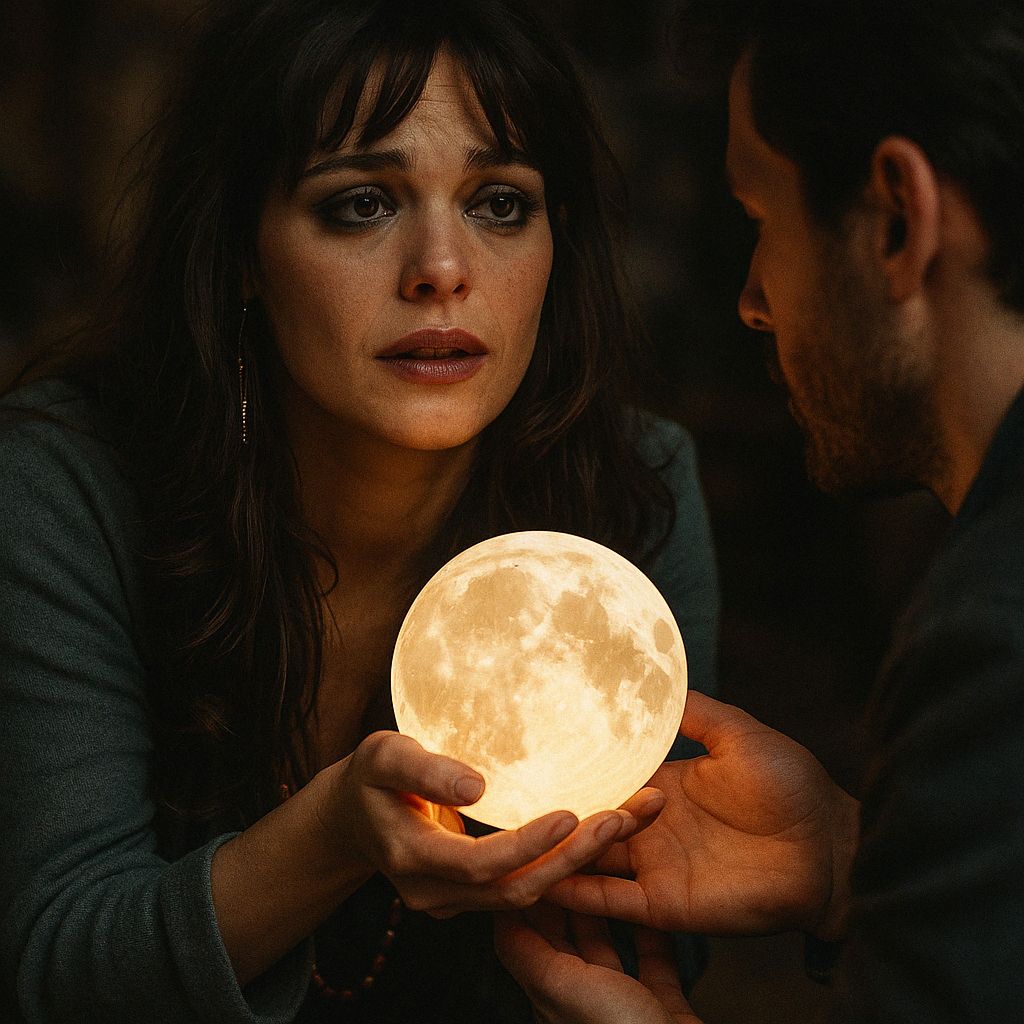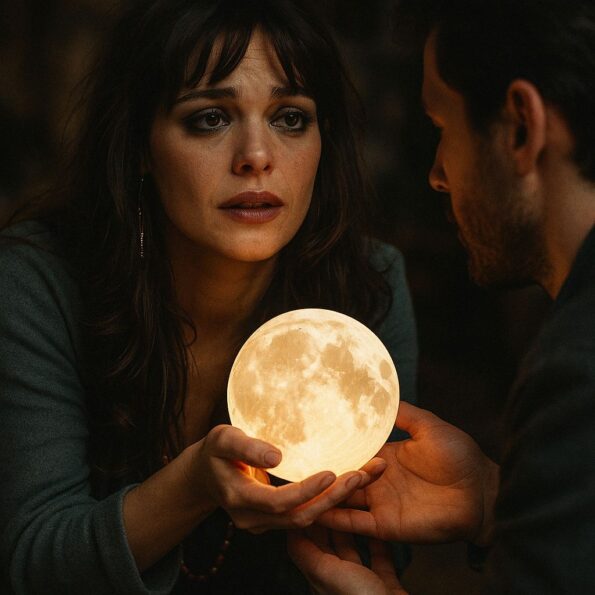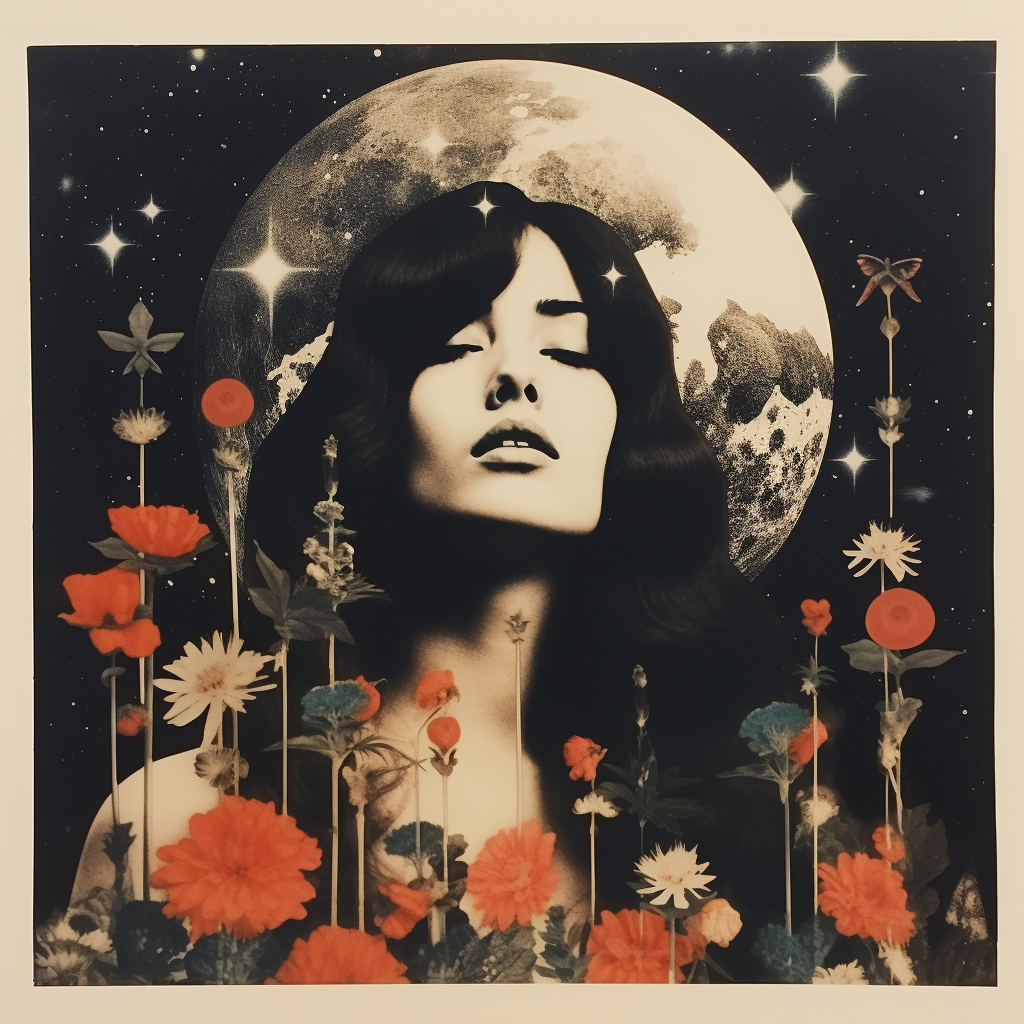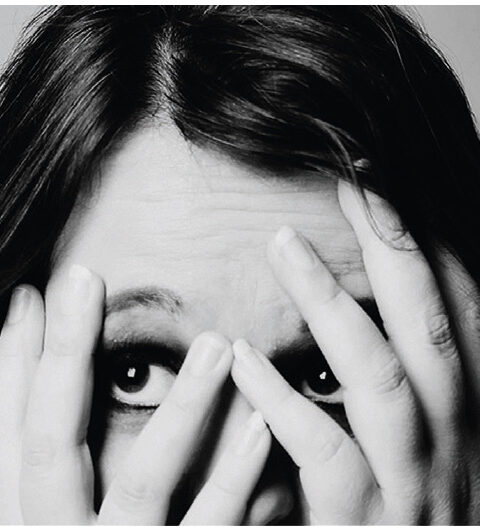
Moon in the 7th House
 The Moon in the 7th house isn’t all about being a bit needy in relationships (although, let’s be honest, there’s a sprinkle of that too). It’s a need for emotional resonance with another being. These are the people who want a psychic womb in which to curl up and feel safe. But the Moon’s presence here also suggests one might unconsciously attract partners who stir their lunar tides in the wrong way—partners who provoke rather than pacify, who challenge rather than cradle. When the Moon, the ruler of our moods and memories, is placed in the house of partnerships, there’s a longing for comfort, for home in another’s arms, and often an almost preternatural attunement to the emotional rhythms of the partner. But therein lies the trouble: when your sense of inner equilibrium depends on the emotional steadiness of another, life can become a bit of a rollercoaster.
The Moon in the 7th house isn’t all about being a bit needy in relationships (although, let’s be honest, there’s a sprinkle of that too). It’s a need for emotional resonance with another being. These are the people who want a psychic womb in which to curl up and feel safe. But the Moon’s presence here also suggests one might unconsciously attract partners who stir their lunar tides in the wrong way—partners who provoke rather than pacify, who challenge rather than cradle. When the Moon, the ruler of our moods and memories, is placed in the house of partnerships, there’s a longing for comfort, for home in another’s arms, and often an almost preternatural attunement to the emotional rhythms of the partner. But therein lies the trouble: when your sense of inner equilibrium depends on the emotional steadiness of another, life can become a bit of a rollercoaster.
This placement, too, suggests someone who may unconsciously recreate familial dynamics in their adult partnerships. It’s not uncommon to find that the emotional patterns established early in life—particularly in relation to the mother or primary caregiver—are played out again and again in romantic entanglements. One may seek out partners who feel familiar in an eerie, fated way—people who mirror the comforting or chaotic tones of childhood, sometimes to healing effect, sometimes not. And yet, this Moon also offers its emotional gifts. There’s a protective quality here, a sincere desire to support and be supported, to create a safe emotional harbor where two souls can lay down their burdens and rest. But one must learn to sit with their emotions without always outsourcing them for approval or soothing.
This placement is soaked in the warm milk of emotional connection, and yet, as with all things lunar, there’s a subtle sadness beneath the softness. When the Moon is in the 7th house, relationships cease to be mere life choices—they become emotional lifelines. Without this emotional closeness, without the steady drip of affection and understanding, life can feel oddly grey, hollowed out. There’s often a tendency to lean heavily on their partner, but this isn’t in a clinging, melodramatic fashion necessarily, more like a child instinctively curling into the warmth of a trusted adult. The partner becomes the moon to their Earth, dictating tides, stirring dreams, silently shaping the terrain of their emotional lives.
And yet, this very leaning, their open-hearted longing, carries a vulnerability. Because if you invest your emotional security in someone else, then their withdrawal—even momentary—can feel like you’re unsafe. These people often give from the deepest wells of their hearts—offering empathy, softness, and intuition to others. But they do so with an expectation, sometimes unspoken, that their partner will meet them there. If they don’t—if emotional expression is met with silence, cynicism, or detachment—it’s more than disappointment; it’s devastation.
Shared Soul Territory
To have the Moon here is to carry your emotional weather into every connection. But unlike the more solitary emotional processes of, say, the 12th house, this is shared soul territory. Conflict, harmony, longing, reassurance—all of it becomes exchange. Take Moon in Virgo in the 7th, for example. Here, emotional needs might manifest through acts of service, quiet caretaking, or even worry. There’s a yearning to fix or perfect the emotional dynamic, sometimes to the point of forgetting one’s own needs in the process. Contrast it with Moon in Aries here—bold, immediate, emotionally impulsive. Such a person may seek intensity, passion, and quick reassurance, sometimes mistaking conflict for connection.
Each Moon-sign combination colors the relational palette. A Capricorn Moon might bring emotional restraint, seeking security through reliability in a partner. A Gemini Moon, by contrast, seeks emotional stimulation, conversation, variety, and the freedom to mentally flit about. But all of them, regardless of sign, share the deep lunar longing for emotional bonding through the relational mirror. They seek to know themselves through the gaze, the touch, the reflection of another. It’s both beautiful and precarious. Because when your emotional self is outsourced to another, their absence—or even disapproval—can feel like an eclipse of your own light.
The task for the Moon in the 7th house isn’t to abandon this need for connection. This would be a betrayal of their very nature. It’s to become aware of the emotional projections they cast onto others. To recognize, with gentleness, when their unmet childhood longings are masquerading as adult expectations. And from this awareness, to begin forming relationships that are not emotional crutches, but spaces for mutual growth.
The Ever Responsive Moon
The Moon, ever responsive, ever mutable, does not assert so much as absorb. It remembers in feelings not logic. It stores these emotions—each moment catalogued in its secret tidepools. When this Moon finds itself in the 7th house, it becomes in relation to others. This individual can become exquisitely attuned to the emotional needs of others. They can intuitively sense the currents beneath a partner’s surface, often responding before words are even spoken. There’s a genuine ability here—a kind of relational empathy that’s more felt than understood. But on the other hand, this same fluidity can lead to over-identification with the other. What happens when your emotional state changes with their moods, their silences, their shifting tides?
When the Moon resides here, the individual may feel most emotionally safe within the container of a committed relationship. They seek a partner to hold space for their feelings, to witness the ebb and flow without fear or judgment. But the lunar lesson: they must be cautious not to let their need for emotional stability make them cling to relationships that are more container than communion. Not every vessel is worthy of your waters. Some may leak, some may confine, some may shape you into something unrecognizable. The challenge is to find—or better yet, co-create—a relationship that both holds and honors the authentic flow of your emotional self.
This placement also offers a kind of emotional diplomacy in public and social settings. One can become the peacemaker, the softener of harsh edges, the one who understands how to nurture collaboration and mutual care. But again, the caution is not to overextend this gift into people-pleasing, to sacrifice the self in the name of keeping the relational waters calm.
The Need to Bond
The Moon in the 7th house is the eternal emotional seeker, ever scanning the horizon of partnership for someone who feels like home. This Moon naturally orients itself toward “the other” as the source of emotional food, sometimes long before it’s truly ready to blossom on its own. You see, the Moon is instinctual—it doesn’t choose so much as it gravitates. And in the 7th house, the gravitational pull is directed straight toward relationships. Toward the promise, however illusory, that someone else can fill the hunger we carry within. So quite often, this results in people leaping into relationships early, keen to lock in this sense of belonging before they’ve had time to map the contours of their own inner world. It’s not unusual to find them married young or deeply entangled with a partner before they fully understand their own emotional needs.
But herein lies the dilemma: because the Moon craves safety, it can confuse familiarity with love. It might draw to it partners who reflect the emotional climate of childhood—not necessarily the most functional or free—but familiar, even if this familiarity is tinged with volatility or control. If one’s early experience of love was tender but conditional, or nurturing but inconsistent, the Moon in the 7th might unconsciously seek out this same dynamic, recreating the emotional home of their youth in adult partnerships.
The partner may adopt a kind of parental stance—soothing, protecting, even managing the emotional tides of the Moon-in-the-7th individual. On the surface, this can feel comforting, even necessary. But over time, it risks infantilizing the emotional self, reinforcing the idea that one must depend on another for emotional equilibrium. It can become a subtle form of emotional outsourcing, where one’s own feelings are only processed in the presence—or through the interpretation—of the partner.
What’s so profound about this placement is its potential for transformation. If the individual begins to recognize their own patterns, they can start to reclaim their emotional autonomy. Relationships stop being emotional lifeboats and become vessels of conscious connection. The partner is no longer a surrogate parent, but a true equal—someone who shares the emotional space rather than managing it. Because those with the Moon in the 7th, once integrated, can be among the most emotionally attuned, responsive, and deeply connected partners in the zodiac. They’re the ones who truly see their loved ones, who hold emotional space. When they stop seeking themselves in others and start sharing themselves with others, the moonlight stops being a reflection of another’s glow and becomes a gentle light of its own.
Over-adjusting in Relationships
With the Moon in the 7th house, the emotional self is often discovered through relationships, sometimes to the person’s surprise. It’s full of childhood memories, unconscious longings, and unspoken fears. The partner’s emotional responses become a kind of mirror, and when the mirror is clear and loving, all is well. But if it’s distorted—indifferent, harsh, inconsistent—then the Moon-person may feel they themselves are broken. These individuals often possess an extraordinary emotional intelligence, sensing shifts in mood and needs. They adjust, they soothe, they morph. But too often, they overadjust. They become so fluid, so attuned, that they risk evaporating entirely, their own needs dissolving in the pursuit of relational harmony. This can breed resentment, confusion, and the emptiness that arises when we’ve given too much of ourselves away.
Now, throw in some difficult aspects—say a square from Saturn, or an opposition from Pluto—and the plot thickens. These aspects act like storm clouds over the Moon’s calm waters. Saturn’s influence might freeze the flow, making one cautious, hesitant, afraid of others. The emotional self becomes guarded, the heart unsure if it’s safe to open. Relationships may feel delayed or fraught with responsibility, as if love is a duty. With Pluto, the emotional dynamics may take on intensity, even obsession. There’s a magnetic pull toward transformative, sometimes turbulent partnerships. The partner becomes a force of destruction and rebirth, dragging the Moon-person through the underworld of their own emotional landscape. It can be brutal—but it can also be deeply healing, if one learns not to fear the depth. These challenging aspects often point to earlier life imprints—perhaps a parent who was emotionally distant, unpredictable, or burdened with their own pain. And so, in adulthood, relationships become the arena where these unconscious contacts play out.
But healing is possible—profoundly so. It begins when the Moon in the 7th learns to turn some of their empathy inward. To become a container for their own emotions. To recognize when they are projecting unmet needs, and instead of trying to extract fulfillment from a partner, to meet themselves with the same tenderness they so readily offer. Only then can they engage in relationships as co-creators rather than emotional mirrors.
The early Imprint
The Moon remembers feeling, especially when feelings were first formed in early life. It is both the reflection and the origin of emotional response, a kind of psychic fingerprint left by the first experiences of care—or lack thereof. The early maternal imprint casts a long emotional shadow. Sometimes, it’s a comforting one—we seek out partners who replicate her warmth, her laughter, her quiet strength. But sometimes, we spend our adult relationships subconsciously trying to resolve what we couldn’t fix as children. We may choose partners who carry her wounds, or who mirror the aspects of her that made us feel small or unseen. This doesn’t mean we’re doomed to repeat the past. In fact, awareness of these patterns is the gateway to emotional freedom. Once we recognize that our relationship choices are often reenactments of early emotional scripts, we can begin to edit the story. We can ask: is this love, or is this a familiar ache I’ve mistaken for love?
For individuals with this placement, it brings with it the full sweep of emotional highs and lows. These are the people who feel seen in the mirror of a partner’s gaze, but also in the mirror of the public. Their emotional well-being is, at least in part, tied to how they are perceived. The same lunar sensitivity that makes them wonderful partners also renders them susceptible to the shifting tides of public favor. This emotional link to the public can manifest in countless ways. For the artist, the activist, the public speaker—this Moon allows them to intuit what people need to hear, to feel. They’re often emotionally persuasive without trying to be, because their very presence carries a sincerity that draws people in. But it also means that criticism cuts deeper, and public rejection can feel less like a professional blow and more like personal abandonment.
It’s a curious kind of marriage. The public becomes an audience and an emotional partner. These individuals can become masters of emotional diplomacy—soothing tensions, reflecting cultural moods, sensing shifts in the societal atmosphere before they fully form. Their gift is responsiveness. Their challenge is over-identification. Because when you’re always attuned to what others want from you—whether it’s a partner or a public—you risk forgetting what you actually feel. The approval of the crowd can become as addictive as the affection of a lover, and just as destabilizing when withdrawn. So the work here is to create a healthy boundary between the self and the response. To know that applause is sweet, but silence does not mean you’ve disappeared.
When the Moon is well-aspected in this house—trines or harmonizing in sextiles—the individual is perfectly attuned to the currents of human connection. They know, almost instinctively, how to give-and-take in partnership, when to comfort, when to step back, when to open the arms and when to close the door. Their relationships tend to be marked by warmth and mutual understanding, and their public interactions are likely to be suffused with a kind of emotional intelligence that makes people feel seen, even in a crowd.
But when the Moon is stressed—squaring off with Mars, Saturn, Uranus, Pluto—then emotional equilibrium becomes elusive, and relationships may veer wildly from comfort to conflict. The emotional hunger, ever-present with the Moon in this position, is still there, but its satisfaction is often obstructed. The person may oscillate between craving closeness and fearing it, between pouring their heart out and withdrawing into emotional silence. These individuals may attract partners who reflect the challenging qualities of their Moon’s aspects—distant, controlling, unpredictable—or they may play out those dynamics themselves. The highs are high, the lows are lunar eclipses. There is, at times, a kind of emotional weather system within the partnership that no one can quite predict.
And yet, even in this turbulence, there is potential for growth of the most profound kind. These are souls who are meant to learn about emotional boundaries, about the alchemy of need and giving, about the art of being present without dissolving. When balance is found, the Moon, even under pressure, learns to shine steadily in the sky of the self. They connect, heal, and bring a kind of emotional integrity the world sorely needs.





 Sun Square Pluto Synastry: You’ve Got That Power Over Me
Sun Square Pluto Synastry: You’ve Got That Power Over Me
 Scorpio’s Cold Withdrawal
Scorpio’s Cold Withdrawal
 Moon Conjunct Pluto Synastry
Moon Conjunct Pluto Synastry
 Venus-Pluto Synastry: A Love So Powerful That It Might Just Kill Them
Venus-Pluto Synastry: A Love So Powerful That It Might Just Kill Them
 Mars Square Pluto Natal Aspect: The Unbreakable Spirit
Mars Square Pluto Natal Aspect: The Unbreakable Spirit
 Reflections on a Past Venus-Pluto Synastry Aspect
Reflections on a Past Venus-Pluto Synastry Aspect
 Mercury Conjunct Venus Synastry
Mercury Conjunct Venus Synastry
 Mars-Pluto Synastry: Something Quite Dark and Dangerous
Mars-Pluto Synastry: Something Quite Dark and Dangerous
 Uranus Transits 8th the House: Rebirth from Chaos
Uranus Transits 8th the House: Rebirth from Chaos
 Venus Trine Mars Synastry
Venus Trine Mars Synastry
 Mars-Saturn Synastry: The Eternal Loop
Mars-Saturn Synastry: The Eternal Loop
 Composite Sun in the 8th House: Weather the Storm
Composite Sun in the 8th House: Weather the Storm
 Mars in Aquarius: Sex drive
Mars in Aquarius: Sex drive
 Sun Conjunct Pluto Synastry: Enlightening or Annihilating
Sun Conjunct Pluto Synastry: Enlightening or Annihilating
 Venus Trine Pluto: Dark Desires
Venus Trine Pluto: Dark Desires
 Mars Conjunct Pluto Synastry
Mars Conjunct Pluto Synastry
 Moon Opposite Uranus Natal Aspect
Moon Opposite Uranus Natal Aspect
 The Watery Gardeners: Cancer, Scorpio, and Pisces
The Watery Gardeners: Cancer, Scorpio, and Pisces
 Transiting Pluto Aspect Natal Mars: Are You Mad as Hell
Transiting Pluto Aspect Natal Mars: Are You Mad as Hell
 Moon Conjunct Pluto Natal Aspect: Emotional X-Ray Vision – Seeing Through Souls Since Birth
Moon Conjunct Pluto Natal Aspect: Emotional X-Ray Vision – Seeing Through Souls Since Birth